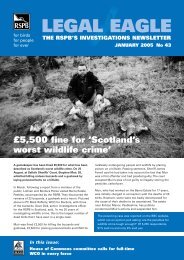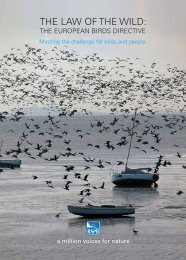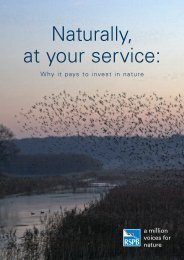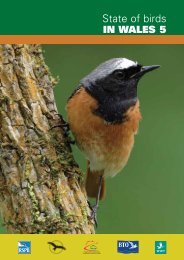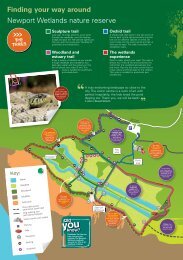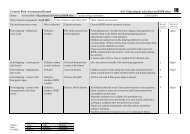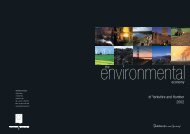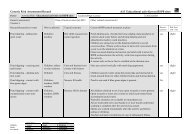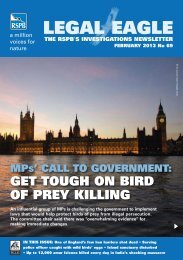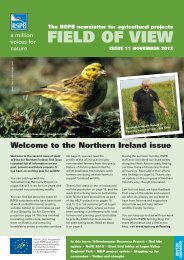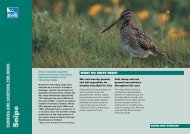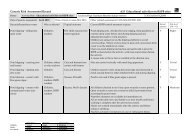BIRDS OF PREY IN THE UK - RSPB
BIRDS OF PREY IN THE UK - RSPB
BIRDS OF PREY IN THE UK - RSPB
Create successful ePaper yourself
Turn your PDF publications into a flip-book with our unique Google optimized e-Paper software.
Foreword<br />
1<br />
Shall I tell you about this peregrine falcon I saw? Oh God, I can hear you groan, cruel beak,<br />
hooked talons, sinister silhouette, death from a clear sky, yeah yeah yeah – why do people go<br />
on about birds of prey so much? What's wrong with all the other groups?<br />
But the best nature poem ever written was by Gerard Manley Hopkins and it was about a kestrel,<br />
not a wren. Heraldry is full of eagles, not starlings. American football teams include Eagles,<br />
Seahawks and Falcons, but no sparrows. If you ask about great birding moments, more people<br />
than not will tell you about a thunderclap vision of a bird of prey.<br />
But perhaps this birds-of-prey thing is a bit crass. Perhaps it is all a bit Jeremy Clarkson: falcons as<br />
boys’ toys: fast, fierce, cool: everything an uncool chap would like to be. Talking about peregrines<br />
can come across like an idiot gushing about his Ferrari.<br />
Despite being so spectacular and often appearing ferocious, they are amazingly fragile. That is what being a bird of<br />
prey means. Even without human intervention, a bird of prey is the most endangered bird in his ecosystem: and the<br />
behaviour of human beings increases the danger.<br />
The bigger and fiercer you are, the rarer you must be: a basic rule of ecology. In a wood, there will be millions of<br />
caterpillars. They will be eaten by dozens of blue tits; the blue tits will be eaten by a single pair of sparrowhawks.<br />
If there is a terrible year for caterpillars, you will end up with a mere handful of blue tits. You will also end up with no<br />
sparrowhawks at all. The blue tits will recover: the sparrowhawks are gone. So if humans chop down half the wood,<br />
there will still be caterpillars and blue tits: but the wood is no longer big enough to support enough blue tits to feed<br />
a single family of sparrowhawks.<br />
But the thing can work the other way. If you have a successful pair of sparrowhawks, what does it say about your<br />
wood? It says that it is in very good shape: if it wasn’t, it couldn’t support the sparrowhawks. So every time you see<br />
a bird of prey, it is the most clear and obvious sign that the place you are in is doing all right.<br />
Even in the best of all possible worlds, birds of prey have the toughest job. It is made even harder because humans<br />
kill them, or allow them to become the accidental victims of attempts to poison other wildlife.<br />
Perhaps the biggest single change in conservation in this country came when certain pesticides were outlawed in<br />
the 1960s. The real victims of the pesticides were birds of prey: as the poisons built up in the ecosystem, our best<br />
species were driven to the edge of extinction. Their recovery is one of the glories of 21st century Britain.<br />
So yes, birds of prey have it tough from every direction. Nature gave them a hard job and<br />
humans have made it even harder. Every living, breeding, surviving bird of prey is a triumph<br />
against the odds. If we want to celebrate their ferocity, we must also celebrate their fragility.<br />
If we sometimes seem to give excessive attention to birds of prey, it is because birds of prey have a<br />
significance that other groups do not. If you are to get a place right – or keep a place right – for birds<br />
of prey, you must look after absolutely everything. You must start at the bottom of the food chain,<br />
and cherish every creature all the way up: because if you don’t, there will be nothing at the top.<br />
Birds of prey are the ultimate contradiction of conservation: what we celebrate as the most wild<br />
and fierce creature of them all is the one that most desperately needs our protection – not because<br />
the birds are inadequate but because we are: we are inadequate at looking after our own planet.<br />
To cherish birds of prey is to cherish everything. Birds of prey need everything to be right: and<br />
when you set eyes on one, it is a celebration of the rightness and perfection of absolutely<br />
everything. Hopkins knew that: “My heart in hiding/ Stirred for a bird, – the achieve of, the<br />
mastery of the thing!”<br />
Peregrine by Mark Hamblin (rspb-images.com)<br />
Simon Barnes, writer and journalist<br />
Birds of prey in the <strong>UK</strong>: on a wing and a prayer




